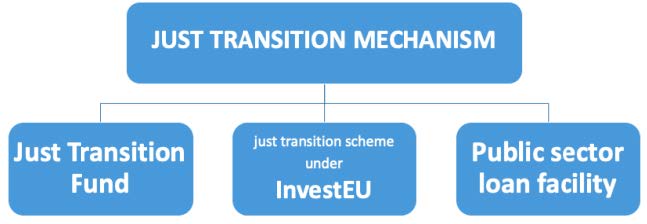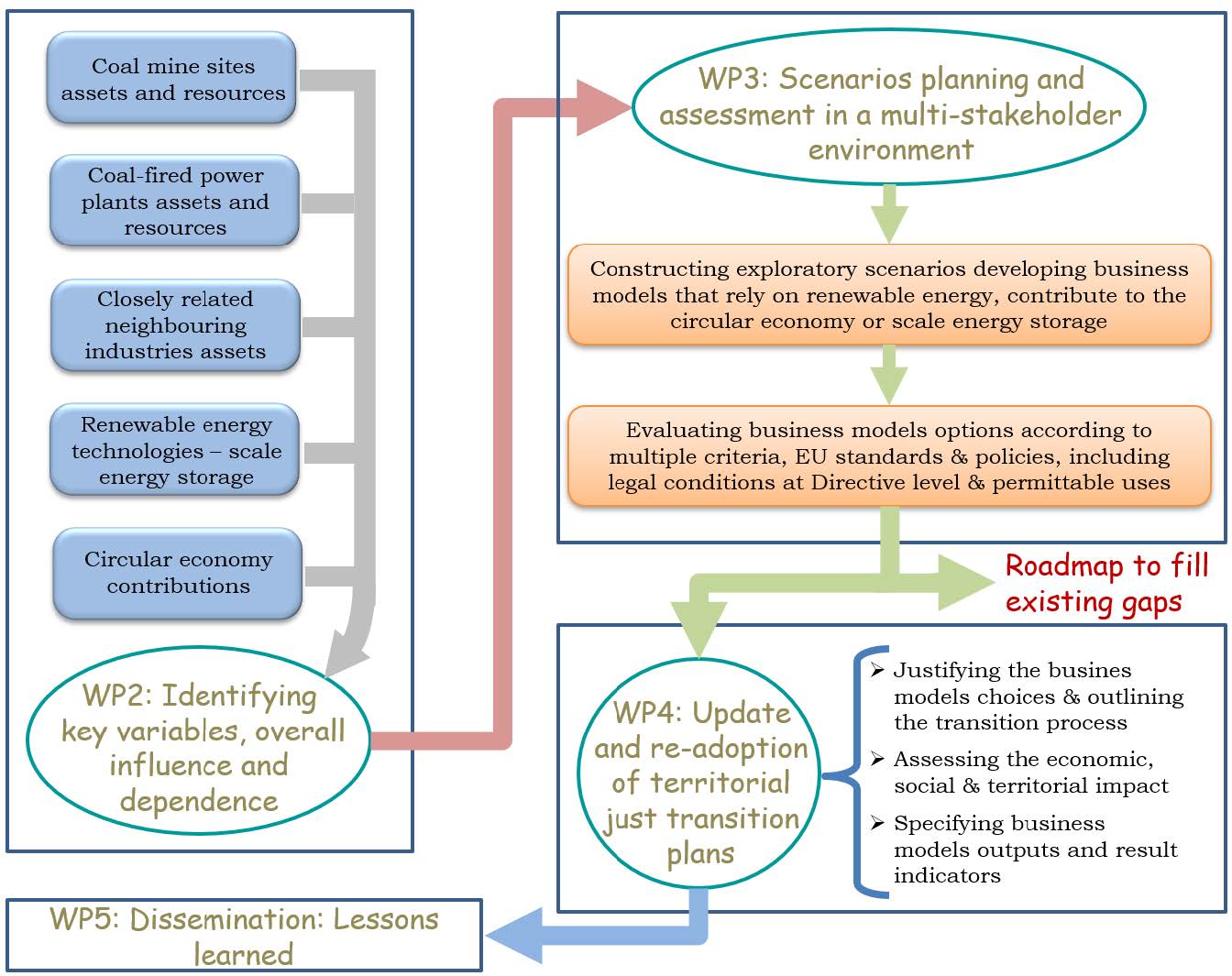Territorial just transition plans
The European Green Deal is the European Union’s response to the climate and environmental-related challenges that are this generation’s defining task. Its investment pillar, the Sustainable Europe Investment Plan will mobilise EU funding and create an enabling framework to facilitate and stimulate the public and private investments needed for the transition to a climate-neutral, green, competitive, and inclusive economy.

It will mobilise at least €1 trillion of sustainable investments over the next decade and will facilitate sustainable investment by public authorities by encouraging green budgeting and procurement, and by designing ways to facilitate procedures to approve State Aid for just transition regions.
The Just Transition Mechanism will be the key tool to ensure that the transition towards a climate-neutral economy happens in a fair way, leaving no one behind. The Mechanism will create the necessary investment to help workers and communities which rely on the fossil fuel value chain. It includes three pillars: The Just Transition Fund, a dedicated scheme under InvestEU, and a public sector loan facility implemented in partnership with the European Investment Bank.

In order to get access to the Just Transition Mechanism, each Member State will have to draw up territorial just transition plans, providing an outline of the transition process until 2030, consistent with the National Energy and Climate Plans and the transition to a climate-neutral economy and identifying subsequently the most impacted territories that should be supported.
For each of these territories, the territorial just transition plans will set out the social, economic, and environmental challenges and give details on needs for economic diversification, reskilling and environmental rehabilitation as appropriate. Territorial just transition plans will be at the centre of the Just Transition Mechanism, and a reference for all its pillars.
The level of support will reflect the magnitude of the challenges in these territories, in terms of the need for both economic diversification and transition towards zero and low-carbon activities with growth potential, and the reskilling of workers in view of equipping them with the necessary skills to take on new jobs.
Territorial just transition plans should be updated and re-adopted when necessary, notably in case of an update of the National Energy and Climate Plans. Moreover, as for all cohesion policy programmes, programmes supported by the Just Transition Fund will be subject to the mid-term review.
Based on results, Just Transition Fund resources could be re-allocated within the Member State in 2025 as part of the mid-term review. The mid-term review will also provide the opportunity to allocate the funding for the years 2026 and 2027, which will be set aside at the start of the next period.
Thus, POTENTIALS can make a strong contribution in the future update and re-adoption of territorial just transition plans.
Anticipated industrial, economic, social, and environmental benefits
The industrial benefits given by the proposal will be, in first place, to deliver a set of synergistic opportunities on feasible reuse options for coupled end-of-life coal mines and coal-fired power plants (and related infrastructure), along with closely related neighbouring industries, in order to stimulate the development of new industrial projects and guarantee their application.
In second place, it will assess how these neighbouring industries can benefit from different scenarios, e.g. greening their power purchases as part of overall sustainability and corporate social responsibility goals, allowing these industries to adopt climate mitigation or renewable energy targets.
As it is fair to assume that communities, commercial entities, and industries would gradually migrate to neighbouring areas and cities in pursuit of economic opportunities, these patterns will exacerbate the negative impacts on the social and economic activities of a once bustling area.
Moreover, the proposal will undergo a territorial impact assessment to analyse the potential territorial impact of the scenario proposals, and to anticipate the economic and social consequences that the scenarios will have on the regions and local communities.
The assessment related to the territorial dimension should limit the risk of “causing an unbalanced territorial or spatial distribution of costs and benefits for different regions”, with the explicit goal of providing information on the territorial distribution of impacts for the different scenarios.
Finally, addressing the environmental benefits, the scenario planning and assessment will identify the strategies reconciling climate action with economic stability and social strategy, contributing to the transition process towards a climate-neutral economy, essential to achieve the Union’s 2030 target for climate set out in Regulation (EU) 2018/1999 and to reach carbon neutrality by 2050.
Moreover, the proposal will consider the targets set by the European Green Deal and related taxonomy.
METHODOLOGY
POTENTIALS’ approach is premised on the notion that in order to stimulate new economic activities and jobs in Coal Regions in Transition, management decisions should be based on a prospective analysis of business models that rely on renewable energy, contribute to the circular economy or scale energy storage. Guaranteeing a sustainable and combined use of assets and resources, otherwise overlooked in these high-velocity environments of phasing out processes, is the necessary ingredient for sound decision-making.
The proposal will be structured into five work packages (WP) in order to develop the methodology of the project, plus a contingency plan, in order to ensure a consistent approach. Apart from WP1 that address project’s coordination and management, the rest of them are presented here:

POTENTIALS will use prospective analysis to identify the optimum business models that coupled end-of-life coal mines and coal-fired power plants, as well as closely related neighbouring industries, should address. Connecting all their components and revealing the variables is essential to the evolution of this system.
POTENTIALS will use one of the most widely employed methodology to accomplish prospective analysis: the scenario method proposed by Godet (2000), a creative and structured process to undergo strategic foresights, and a differentiating factor in decision-making.
Work Package 1: PROJECT COORDINATION AND MANAGEMENT This is the work package in which all the coordination tasks are included: overall technical coordination of the project, organisation and management of meetings, distribution of technical data and information among partners, preparation of minutes and integration of reports, and administrative issues, including relations with the European Commission. This work package will also cover the design, implementation & maintenance of the project website. Work Package 2: IDENTIFYING KEY VARIABLES, OVERALL INFLUENCE AND DEPENDENCE This work package is aimed at determining the most important key variables addressing the synergistic potentials of end-of-life coal mine sites and coal-fired power plants, along with closely related neighbouring industries, related with the implementation of business models relying on renewable energy, contributing to the circular economy or scaling energy storage. The aforementioned variables will be evaluated through the structural analysis method. To undergo the structural analysis of this complex system and to properly identify the overall influence and dependence of the different variables involved, POTENTIALS will use the “Cross-Impact Matrix Multiplication Applied to Classification”. This methodology, known as MICMAC, has been developed by the Institut d’Innovation Informatique pour l’Entreprise 3IE under the supervision of the LIPSOR Prospective Strategic and Organisational Research Laboratory. Work Package 3: SCENARIOS PLANNING AND ASSESSMENT IN A MULTI-STAKEHOLDER ENVIRONMENT This work package will undergo in first place the construction of exploratory scenarios developing business models that rely on renewable energy, contribute to the circular economy or scale energy storage. In second place, a reduction of the initial number of exploratory scenarios to a small number of promising combinations will be accomplished. Work Package 4: UPDATE AND RE-ADOPTION OF TERRITORIAL JUST TRANSITION PLANS As every complex system has its specific characteristics and constraints, POTENTIALS will justify the best business models options and show how they should be adapted according to the expected transition process, in order to cooperate in the updating and re-adoption of territorial just transition plans. Work Package 5: RESULTS DISSEMINATION: LESSONS LEARNED This work package refers to the activities that will be undertaken to support the dissemination and transfer of the Accompanying Measure knowledge and results to the whole European coal industry, policy makers, scientists, trade unions, NGOs and coal industry nearby local communities, ensuring a relevant impact on stimulating new economic activities, developing jobs and economic value, especially in relation to Coal Regions in Transition. As POTENTIALS will be finished in mid-2023, it can make a strong contribution in the future update and re-adoption of territorial just transition plans by providing a roadmap considering for the first time the synergistic potentials of end-of-life coal mines and coal-fired power plants, along with closely related neighbouring industries, an approach that nowadays is completely inexistent. Apart from delivering presentations in international conferences and the dissemination via the web page, where all the documents to be developed within the project will be posted, an international workshop will take place in Poland at the end of the project in order to present the final results from POTENTIALS, to which all previously mentioned stakeholders will be invited.